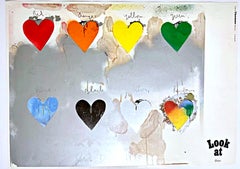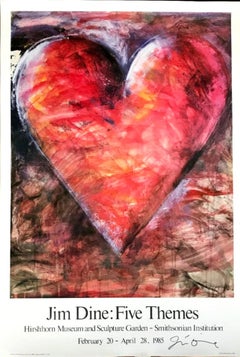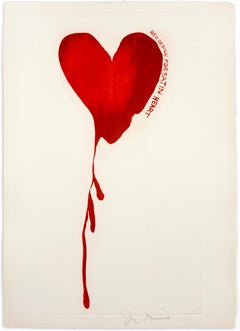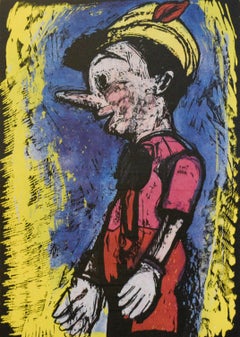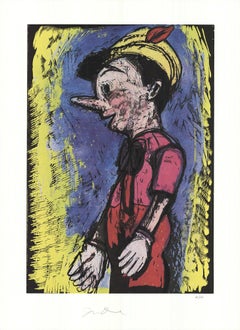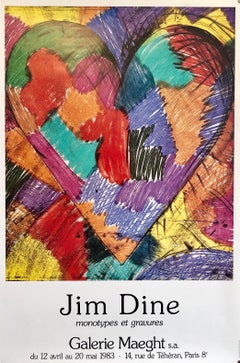Jim Dine Art
The Ohio-born artist Jim Dine brought his ever-shifting, multidisciplinary vision to New York in 1958, a time of transition in the American art world. Abstract Expressionism, which had dominated the scene for years, was on the wane, and a group of young artists, including Dine, Allan Kaprow, Jasper Johns and Robert Rauschenberg, was eager to replace it with a movement that flipped the traditional rules of art-making on their head.
Beyond dissolving the boundaries between mediums and genres, attaching found objects and detritus to their canvases, these revolutionaries began staging performative “happenings” in public spaces, redefining the very definition of a work of art. As Pop art took form, Dine used objects with personal significance, like his paintbrushes, to transform his paintings into two-dimensional sculptures. He was included in the Norton Simon Museum’s 1962 “New Painting of Objects,” often considered the first true Pop art exhibition in America, but he remained a chameleon, constantly changing his style, material and technique.
More than his contemporaries, Dine has forged new paths in drawing, scrawling words and names across the canvas to create graphic, abstract landscapes. He is obsessed by certain motifs — such as hearts and his own bathrobe — which recur in various forms throughout his oeuvre. He has occasionally worked in classical genres, such as portraiture, as exemplified by the 1980 aquatint Nancy Outside in July. He has also co-opted the bold, graphic vocabulary of advertising and commercials, as in the sleek 2010 composition Gay Laughter at the Wake.
Find Jim Dine prints and other art on 1stDibs.
1970s Pop Art Jim Dine Art
Lithograph, Offset
1980s Pop Art Jim Dine Art
Lithograph, Offset, Permanent Marker
1960s Pop Art Jim Dine Art
Etching
Early 2000s Pop Art Jim Dine Art
Screen
Early 2000s Pop Art Jim Dine Art
Mixed Media, Screen, Woodcut
1980s Pop Art Jim Dine Art
Lithograph, Offset
1970s Jim Dine Art
Drypoint, Etching
1990s Jim Dine Art
Lithograph
1970s Pop Art Jim Dine Art
Lithograph, Offset
1960s Modern Jim Dine Art
Etching
1970s Jim Dine Art
Etching
Early 2000s Modern Jim Dine Art
Color, Lithograph, Woodcut
Early 2000s Pop Art Jim Dine Art
Screen, Woodcut
1960s Jim Dine Art
Screen
1980s Romantic Jim Dine Art
Lithograph
1980s Pop Art Jim Dine Art
Lithograph, Offset
1980s Pop Art Jim Dine Art
Offset, Permanent Marker, Lithograph
1980s Pop Art Jim Dine Art
Lithograph, Offset
1970s Pop Art Jim Dine Art
Paper, Offset
20th Century Jim Dine Art
Paper
1970s Pop Art Jim Dine Art
Lithograph
20th Century Pop Art Jim Dine Art
Offset
2010s Pop Art Jim Dine Art
Watercolor, Etching
1990s Pop Art Jim Dine Art
Paper, Screen
1980s Pop Art Jim Dine Art
Lithograph, Offset
1960s Pop Art Jim Dine Art
Offset, Gouache
1960s Post-War Jim Dine Art
Canvas, Wood, Acrylic
1970s Modern Jim Dine Art
Etching
1970s Pop Art Jim Dine Art
Paper, Offset
1970s Pop Art Jim Dine Art
Screen
1970s Pop Art Jim Dine Art
Lithograph
1960s Pop Art Jim Dine Art
Pencil, Lithograph, Offset
Late 20th Century Pop Art Jim Dine Art
Lithograph
1970s Pop Art Jim Dine Art
Lithograph
1970s Pop Art Jim Dine Art
Offset
Late 20th Century Pop Art Jim Dine Art
Lithograph, Screen
1980s Modern Jim Dine Art
Woodcut
1980s Pop Art Jim Dine Art
Paper, Drypoint, Etching, Aquatint
1960s Jim Dine Art
Lithograph
1970s Abstract Expressionist Jim Dine Art
Etching
1960s Modern Jim Dine Art
Lithograph
1960s Pop Art Jim Dine Art
Lithograph
1960s Pop Art Jim Dine Art
Lithograph
1970s Jim Dine Art
Etching
1970s Pop Art Jim Dine Art
Etching
1990s Pop Art Jim Dine Art
Drypoint, Etching
Early 2000s Abstract Expressionist Jim Dine Art
Lithograph
1970s Pop Art Jim Dine Art
Etching
1960s Pop Art Jim Dine Art
Lithograph
1960s Pop Art Jim Dine Art
Screen
Late 20th Century Jim Dine Art
Lithograph
1980s Abstract Expressionist Jim Dine Art
Etching
Early 2000s Pop Art Jim Dine Art
Oil Crayon, Drypoint, Etching, Offset
1970s Pop Art Jim Dine Art
Etching
1970s Realist Jim Dine Art
Woodcut
1990s Pop Art Jim Dine Art
Paper, Engraving, Woodcut
1960s Pop Art Jim Dine Art
Lithograph, Pencil
20th Century Pop Art Jim Dine Art
Offset
Jim Dine art for sale on 1stDibs.
Artists Similar to Jim Dine
- What art did Jim Dine do?1 Answer1stDibs ExpertApril 5, 2022Jim Dine produced collages, paintings, prints, sculptures and photographs. He also gave art performances. His work reflects characteristics of Abstract Expressionism, Neo-Dadaism and Pop art. You'll find a collection of Jim Dine art from some of the world’s top sellers on 1stDibs.
- 1stDibs ExpertMarch 22, 2022Jim Dines' most famous piece of art is The Smiling Workman. It was one of the artist's short art performances known as Happenings. During the 30-second performance, he painted the words "I love what I'm doing, HELP" on a canvas while covered in paint and drinking tomato juice meant to symbolize paint from a glass. On 1stDibs, find a variety of Jim Dine art.
- Why did Jim Dine draw tools?1 Answer1stDibs ExpertFebruary 27, 2024Jim Dine drew tools for several reasons. He believes that tools connect humans with the past, and he is interested in capturing the history of humanity through the tools used by previous generations in his art. In addition, tools hold personal significance for Dine, whose family owned a hardware store in Cincinnati, Ohio. On 1stDibs, find a collection of Jim Dine art.
- Is Jim Dine still making art?1 Answer1stDibs ExpertMarch 22, 2022Yes, Jim Dine is still making art as of December 2021. The American artist has created paintings, drawings, prints, sculptures and photographs over the past 60 years. In January 2021, the Galerie Templon in Paris, France, held a new exhibition of his work entitled “A Day Longer.” On 1stDibs, find a selection of Jim Dine art.
- What is Jim Dine famous for?1 Answer1stDibs ExpertAugust 15, 2024Jim Dine is famous for his work as an artist. He brought his multidisciplinary vision to New York in 1958, a time of transition in the American art world. Abstract Expressionism, which had dominated the scene for years, was waning, and a group of young artists, including Dine, Allan Kaprow, Jasper Johns and Robert Rauschenberg, was eager to replace it with a movement that flipped the traditional rules of art-making on its head. As Pop art took form, Dine used objects with personal significance, like his paintbrushes, to transform his paintings into two-dimensional sculptures. He was included in the Norton Simon Museum’s 1962 “New Painting of Objects,” often considered the first true Pop art exhibition in America, but he remained a chameleon, constantly changing his style. Dine has forged new paths in drawing, scrawling words and names across the canvas to create graphic, abstract landscapes. Some of his best-known works include his Tool Box series, Four Hearts, Tinsnip and The Robe. On 1stDibs, shop a range of Jim Dine art.
- Why did Jim Dine paint hearts?1 Answer1stDibs ExpertFebruary 22, 2021Jim Dine painted hearts because he was a self-described romantic artist. He embraced the heart because he believed it was a shape with boundless possibilities and a complex meaning. He explored relationships of color, texture and composition through the heart.
